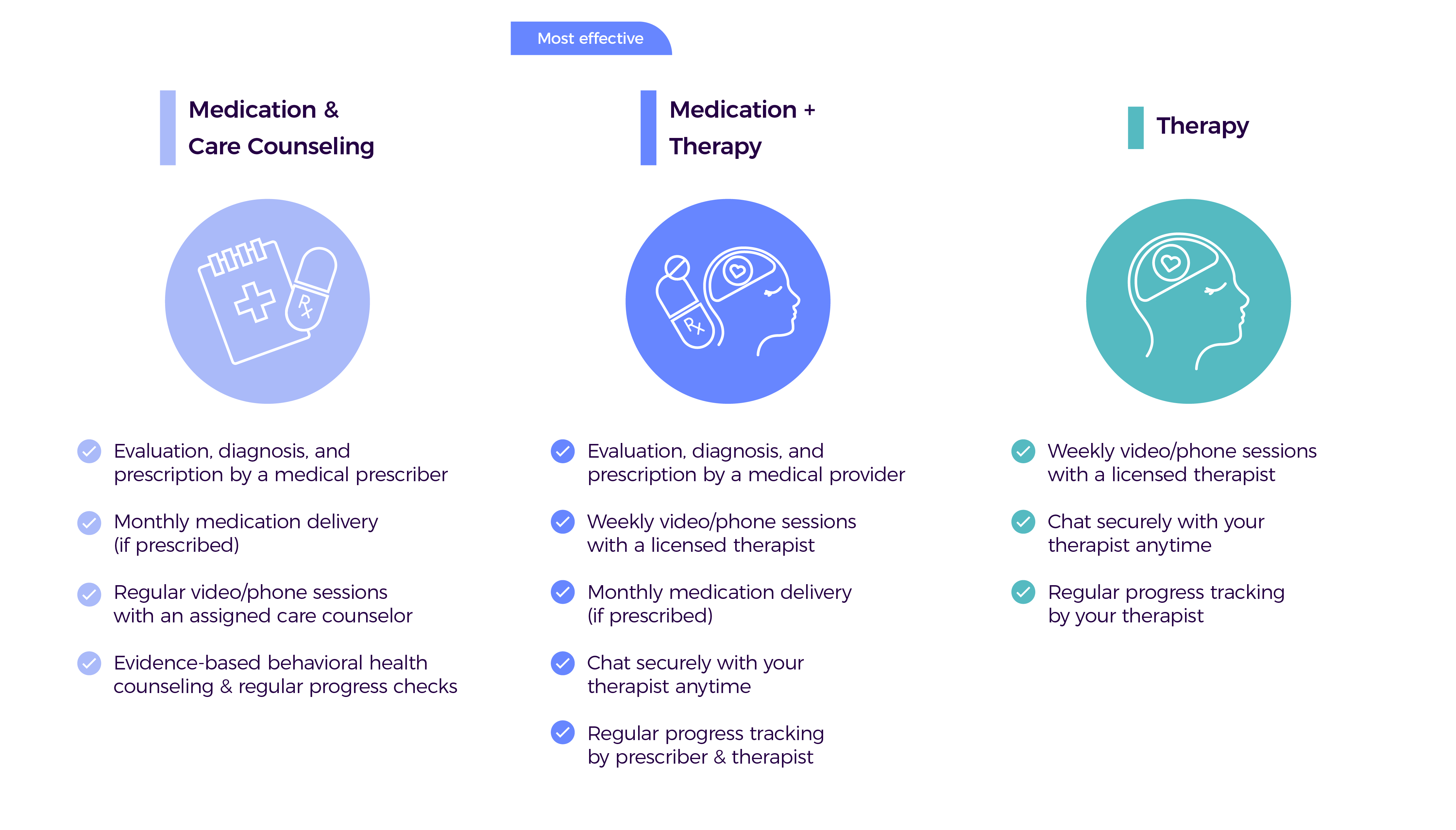Mental health disorders are very common in the U.S. In 2019, the National Institute of Mental Health estimated that 1 in 5 Americans live with a mental illness. Yet, less than half of that population received treatment for their condition.
Anyone who’s tried to receive mental health care in the U.S. can probably tell you why so few people receive the treatment they need and deserve. Traditional care is inaccessible, difficult to navigate, and, perhaps most importantly, it’s far too expensive.
Thankfully, telehealth and the online model of care are breaking down barriers and making mental health care more accessible than ever. And Cerebral is making sure that everyone can afford the full range of services: from medication prescription to behavioral health counseling and even weekly therapy.
These options are not only more affordable than traditional care, studies show they’re just as effective!
But let’s step back for a moment and look more closely at the traditionally high costs of mental health care.
Costs and Considerations of Mental Health
Even for people who get past the stigma of receiving mental health care and find someone to deliver their care, the cost of treatment remains the highest and most challenging barrier. A lack of financial resources prevents many people from seeking treatment at all or from receiving consistent or adequate care for their mental health.
Other costs and things to consider when it comes to mental health treatment include:
Health insurance: What mental health services does your plan cover? Do you need to submit receipts for reimbursement? Does your insurance company even have a provider ready to treat you? Many companies don’t have providers available, so you have to wait months to receive care.
Location and convenience: Are there mental health providers available in your area? Do you need to travel long distances to see them? Most people can’t take regular time away from work to go to an office.
Time and availability: How much time can you devote to researching and finding a care team for your mental health? How much energy do you have to make appointments and receive care regularly?
When you take a step back to consider all of these costs, you may start to wonder: how can I afford all of this?
Does Health Insurance Cover Mental Health Treatment?
The good news is that Cerebral has insurance options you can use to pay for mental healthcare.
It may be comforting to learn that under the Affordable Care Act (ACA), mental and behavioral health services are considered essential health benefits that must be covered under health insurance. Most employer-sponsored plans must also include mental health services under the ACA.
In-Network Insurance
When you see an “in-network” health care service, it means that they’ve negotiated with your insurance company to accept a discounted rate for their services. You pay the difference between the discounted rate and the amount that your insurance company is responsible for. Sometimes you don’t have to pay anything at all.
Typically, you will pay less and save more when you see an in-network provider.
You can save money by using health insurance to pay for in-network online mental health treatment. Here at Cerebral, we’re partnering with more and more insurance companies. That means more members may be able to use their health insurance to pay for medications, provider visits, and therapist visits.
If you have qualifying in-network insurance, you’ll only pay $29 for any of our plans. Prescribing provider visits, therapist visits, and medication are all charged separately and may be covered by your insurance. They may be covered completely, or you may owe a copay or coinsurance, depending on your insurance plan.
You can save money with in-network providers, but what if your insurance plan is not considered “in-network” with Cerebral? No problem! We have options for you. Read on.
Out-of-Network Reimbursement
When a health care service is considered "out-of-network", it means that they aren’t contracted by your insurance company to provide a discounted rate.
However, depending on your insurance plan, you may be able to save on the cost of out-of-network services by getting reimbursed by your insurance company.
At Cerebral, we'll help you with the reimbursement process. If you have insurance that isn't considered in-network with Cerebral, contact us. We’ll send you an invoice that you can submit to your insurer for possible subscription reimbursement. Make sure you schedule and attend all your prescribing provider and/or therapist visits to be eligible for any reimbursements!
What are FSAs and HSAs?
You can also save on our monthly subscription plans by using a flexible spending account (FSA) or a health savings account (HSA).
Flexible spending accounts (FSAs) and health savings accounts (HSAs) are similar but have a few key differences. An HSA is essentially a savings fund you can use exclusively for your medical needs, like prescriptions. It’s usually included with most high-deductible insurance options.
An FSA is the same thing, but it has to be set up through your employer. The funds in your FSA must also be used by a certain date, or else you run the risk of losing that money.
You can also use these accounts to offset any other out-of-pocket expenses you get for treatment.
There are two ways in which you may use HSA/FSA funds to cover your Cerebral prescription:
- If you have your HSA/FSA connected to a card, enter that card information as your payment method on file.
- If you need to submit a receipt for reimbursement, you may request an itemized receipt by emailing us at support@getcerebral.com.
How Cerebral Makes Treatment Accessible for Everyone
Research has shown that online therapy is just as effective in reducing symptoms of anxiety and depression as traditional face-to-face therapy. There is also research that suggests digital mental health services are effective at addressing symptoms of insomnia, and can be used to improve sleep quality and wakefulness.
Studies have also shown that tele-psychiatry is cost-effective and comes with high reports of patient satisfaction.
People who use online mental health services are more likely to receive care consistently, since barriers like driving long distances to get to appointments are basically eliminated. It’s also enormously helpful for people living in remote areas who may not be able to conveniently see a therapist or medical professionals regularly.
Cerebral’s mission is to increase access to quality mental healthcare by providing an affordable, one-stop approach to mental health treatment. That’s why we:
- give you access to the best care possible without needing to leave your home;
- connect you to quality therapists and medical care without the burden of needing to research and screen prescribing providers; and
- offer affordable membership options that include medication management, therapy, and mental health counseling.
Our affordable membership subscriptions include:

We believe that everyone deserves access to quality mental healthcare. Join us today!
Medically reviewed by: David Mou, MD, MBA

Our Care: The Resilience Methodology

A New Era of Mental Healthcare: How Cerebral Is Expanding High-Quality, Personalized Care

5 Things to Look for in a Therapist

Call 911 if you’re having a
mental health emergency
Text Home to 741-741 if you're in emotional
distress and need immediate support
Call or text 988 Suicide &
Crisis Lifeline. Chat service
is available at 988lifeline.org.